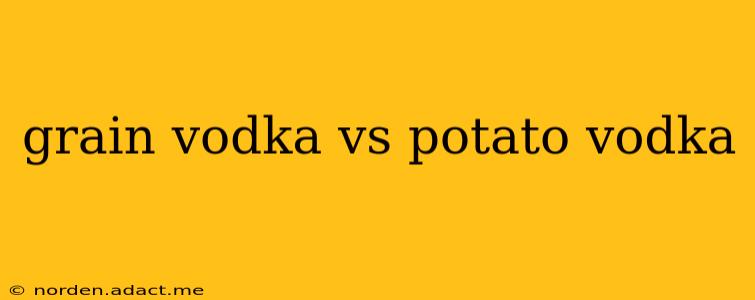Vodka, a spirit known for its clean, neutral flavor profile, is produced from a variety of sources, most commonly grains and potatoes. While both grain and potato vodkas aim for a similar end result – a smooth, almost flavorless spirit – there are subtle differences in their production, taste, and overall character that discerning drinkers may appreciate. This comprehensive guide dives deep into the distinctions between grain and potato vodka, answering frequently asked questions along the way.
What is the difference between grain and potato vodka?
The primary difference lies in the base ingredient: grain vodka uses grains like wheat, rye, corn, or barley, while potato vodka utilizes potatoes as its primary source of starch. This difference in base ingredient influences the production process and, to a lesser extent, the final product's taste and texture. Grain vodkas often undergo a fermentation process using yeast, which converts the sugars in the grain into ethanol. Potato vodkas follow a similar path, but the potatoes must first be processed to release their starches before fermentation can begin.
Does potato vodka taste different than grain vodka?
Many claim that potato vodka possesses a slightly creamier, smoother mouthfeel compared to grain vodka, which can sometimes exhibit a slightly sharper, more assertive taste. However, these differences are often subtle and depend greatly on the specific brand, distillation methods, and filtration processes employed. High-quality vodka, regardless of its base, strives for a neutral flavor profile, making blind taste tests challenging even for experienced palates.
Which type of vodka is better?
There's no single "better" type of vodka – it's entirely a matter of personal preference. Some individuals prefer the perceived creaminess and smoothness attributed to potato vodka, while others find the slightly drier notes of grain vodka more appealing. The best way to determine your preference is to try various brands of both grain and potato vodkas and compare their characteristics. Ultimately, the quality of the vodka, regardless of its origin, is a far more significant factor than the base ingredient alone.
Is potato vodka smoother?
The perception of smoothness is subjective, but many believe potato vodka offers a smoother, silkier mouthfeel than grain vodka. This perceived difference may stem from the slightly different chemical composition resulting from the varying fermentation processes and the nature of the starting materials. However, this is not a universal truth, and many high-quality grain vodkas achieve exceptional smoothness through meticulous distillation and filtration.
Is one type of vodka healthier than the other?
From a purely nutritional standpoint, both grain and potato vodkas are essentially the same: they are calorie-dense alcoholic beverages with minimal nutritional value. The calories in vodka come primarily from the alcohol itself, with the base ingredient having minimal impact on the overall nutritional profile. Focus on moderation rather than choosing one type over another for health benefits.
What is the best vodka for cocktails?
The "best" vodka for cocktails depends entirely on the cocktail itself and personal preference. Some cocktails, particularly those with delicate flavor profiles, might benefit from the perceived smoothness of potato vodka. Others, especially those emphasizing boldness, might pair better with the sharper notes sometimes found in grain vodkas. Experimentation is key to discovering your preferred vodka for each type of cocktail.
Conclusion
The choice between grain and potato vodka ultimately comes down to individual taste. Both types can produce exceptional spirits, and the quality of the vodka itself significantly outweighs the base ingredient in determining its overall appeal. Exploring different brands and types is the best way to discover your personal preference and find the perfect vodka to suit your palate and your favorite cocktails.
